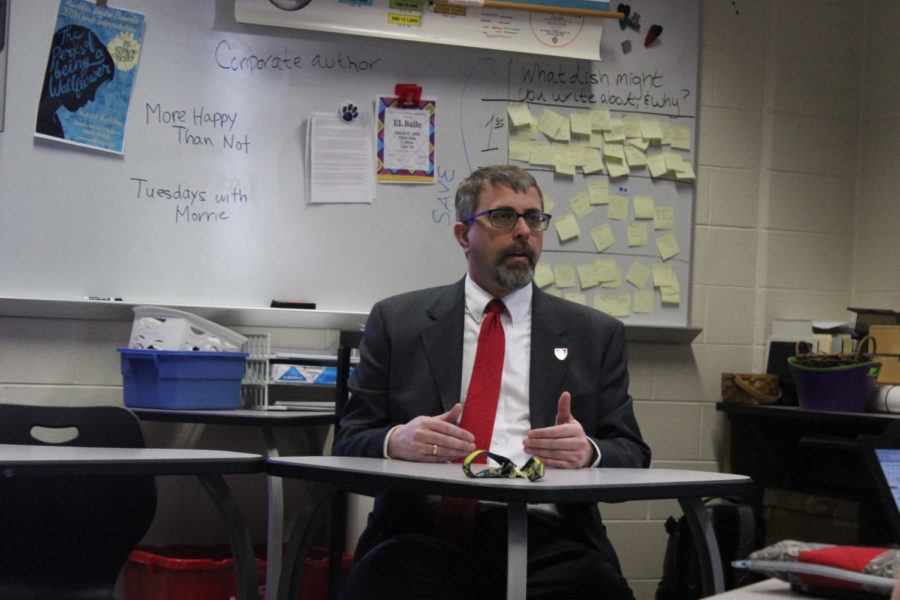Principal Holds Press Conference with The Mustang Staff
Dr. Anthony Kroll, principal, discusses recent controversies and the solutions being implemented by the school.
March 19, 2018
On Tuesday, March 13, Dr. Anthony Kroll, principal, had a press conference with the staff of the school newspaper after requesting a time to speak with the press. Discussion topics consisted of the instances that occurred in February relating to school safety and acts of hate speech. “I appreciate the opportunity to speak to the press regarding the instances that occurred at Mundelein High School over the past month,” said Dr. Kroll. “We definitely take this seriously whether for our school safety or for our school culture, and we expect that through this conversation and the work that we are doing post these incidents, that we can make Mundelein a stronger community.”
To hear the entire 30-minute press conference, click here.
Q: Do you think in terms of the hate speech that was said, do you think it goes beyond racism to just ignorance? Do you think we should start teaching about diversity?
A: Certainly I feel that the school as a whole, as an educational facility, should take on some of that role absolutely– at least to explain how it impacts other people and how other people feel about it, what are the origins of that word in particular, where that word came from and why it’s not a popular acceptance. Now, at the same time, words mean different things to different groups.
Q: Do you hope to educate those groups on what they say and how it affects others?
A: Since the incident of the hate speech, we have formed a committee that has wanted to address that and move forward with it. So, it’s made of students and parents and staff members who are interested in continuing that conversation. They have two goals. One is a short-term goal of allowing places where students can voice their feelings, and then a longer-term goal is bringing in a nationally known speaker who has experience with this topic and can really lead us in a more constructive conversation.
Q: Why were students not able to speak at the turnabout assembly despite many who wanted to speak or who wanted to hear other students speak?
A: As the day went from Thursday to Friday morning, people felt less comfortable in doing that in front of a large crowd, so as that started to deteriorate, we felt that it was better not to put people in a position that they didn’t feel safe. When they feel an opportunity to say what they feel, they should do it in a place where they feel safe. And it was becoming clearer and clearer that they didn’t feel that way going into the assembly…. It is our goal of the [new] Race Equity Committee to create spaces for people to have that opportunity to say what they want to say and to express their feelings. I am willing to work with people to create an all-school forum; I’m trying to do that in a way that would be productive.
Q: What are the consequences for students who produce hate speech?
A: So, there’s a wide range. Certainly, it could be starting with a conversation and it could extend anywhere to an out-of-school suspension. And that’s a spectrum. And people are bothered by the fact that there’s a spectrum there…. There are laws, first of all, that are in place on how and how much we can discipline. That law is called Senate Bill 100, and Senate Bill 100 actually says that we cannot suspend a student over three days without showing that they are a direct threat to our building or other students…..No matter how many days of suspension you do access, you do have to show that you have intervened. You have to show that you have provided some type of intervention for this behavior with this particular student. So, there are parameters around that, and I want people to realize that discipline for us as a school is a part of the educational process. We don’t want to become a prison. We don’t want to become a law enforcement agency. We want to expose the behavior or things that occur that are not correct and work to change them.
Q: How do you want students to act in order to move forward and prevent further incidents?
A: I think the best way to answer that question or what I’d advise my own children to do would be when there’s a situation, when people are using language, for example, that they don’t appreciate or that they know that other people would be sensitive to, that they are just saying, “Hey, that’s not cool, can we not use that language?” and just draw attention to it. Most often I find that bringing that type of conversation to the front is enough of a deterrent for people to change their ways rather than being punishing and giving consequences. I think that the opportunity for conversation is more beneficial to stopping behavior that you want.
Q: How do we rebuild our reputation?
A: We build a reputation by how we go out and represent ourselves when we’re here, or when we have people from the community come in, and we meet them. We’ll have 200 board members from around the region coming into the building tomorrow night. Students will be giving tours of our building because they don’t care about me giving them a tour; they care about listening to you and seeing what you are able to do in those classrooms. That’s what gives them the impression and the reputation of Mundelein High School. So, for me, it’s about how we make the story next. This happened at Mundelein High School and how did we move forward from it. How did we then say, “This is the culture that we want?”
